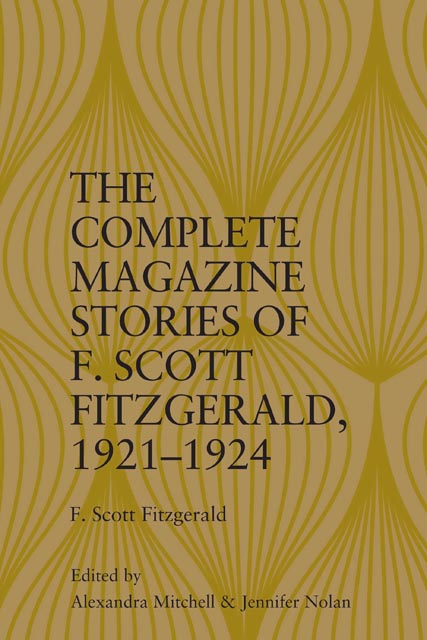Book contents
- Frontmatter
- Contents
- List of Figures
- Acknowledgments
- Introduction
- Stories
- Explanatory Notes, by Alexandra Mitchell
- Appendix 1 Ngram Language Analysis, by Alexandra Mitchell
- Appendix 2 Magazine Publication Details, by Jennifer Nolan
- Appendix 3 Visual Contexts of Fitzgerald’s Magazine Market, Images introduced and compiled by Jennifer Nolan
- Works Cited
Appendix 1 - Ngram Language Analysis, by Alexandra Mitchell
Published online by Cambridge University Press: 18 November 2023
- Frontmatter
- Contents
- List of Figures
- Acknowledgments
- Introduction
- Stories
- Explanatory Notes, by Alexandra Mitchell
- Appendix 1 Ngram Language Analysis, by Alexandra Mitchell
- Appendix 2 Magazine Publication Details, by Jennifer Nolan
- Appendix 3 Visual Contexts of Fitzgerald’s Magazine Market, Images introduced and compiled by Jennifer Nolan
- Works Cited
Summary
From the very beginning of his career, critics and audiences alike were notably impressed by the authenticity of F. Scott Fitzgerald's work. A review of his first novel, This Side of Paradise, which appeared on 1 April 1920 in the St. Louis Post-Dispatch, noted that “Mr. Fitzgerald has all the small talk of undergraduates and the ‘flapper’ at his fingers’ ends,” and as Jackson Bryer has noted, reviews of the novel in college newspapers at the time “all provided ample evidence that Fitzgerald was reaching his own generation by depicting it accurately.” In the words of Matthew J. Bruccoli, “acutely sensitive to the moods and values of his time, [Fitzgerald] was a master of selective detail.”
Thanks to modern technology, we can now quantify just how accurately Fitzgerald depicted his generation. Google Ngram provides a searchable corpus of texts – magazines, books, and journal articles – from 1500 to the present day. The search results show how the concentration of a given word or phrase change over time within the corpus. Figure A.1 gives an example, showing the emergence and decline of the word “flapper” in American English throughout Fitzgerald's lifetime; its concentration in printed texts reached a peak in 1923 before beginning a virtually unchecked decline from the mid-1920s.
Using this technique gives us an indication of how widely used a word or phrase was over a period of time. However, Ngram is not perfect. Most obviously, it tracks only the written and not the spoken word – the “small talk” – that Fitzgerald recorded. Further, the texts in the corpus are digitized using Optical Character Recognition (OCR), a technique that produces consistent and predictable errors – e.g., the word “close” is likely to be rendered as “dose” and “morn” as “mom.” The consistency of OCR errors means that Ngram is more useful as a tool showing relative numbers and changes over time than absolute numbers. More seriously, it is impossible to separate homonyms. An analysis of the phrase “good egg” will include both the colloquial use seen in the stories in this volume and advice to poultry farmers. Finally, the texts in the Ngram corpus are overwhelmingly from Anglo-American sources, which limits its utility for scholars of literature in languages other than English.
Notwithstanding these limitations, Ngram gives us a new perspective on both Fitzgerald and his time.
- Type
- Chapter
- Information
- The Complete Magazine Stories of F. Scott Fitzgerald, 1921-1924 , pp. 388 - 400Publisher: Edinburgh University PressPrint publication year: 2023



